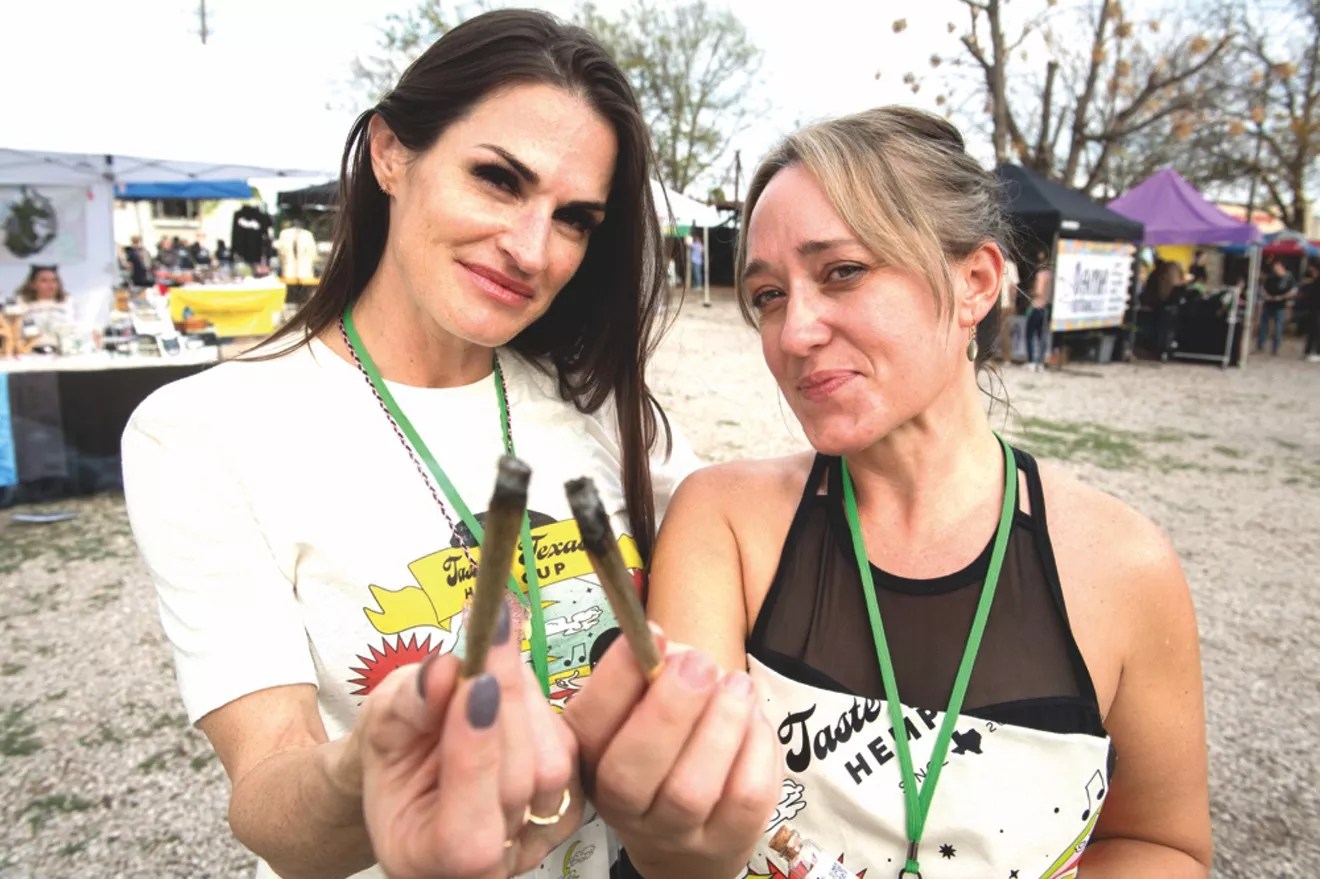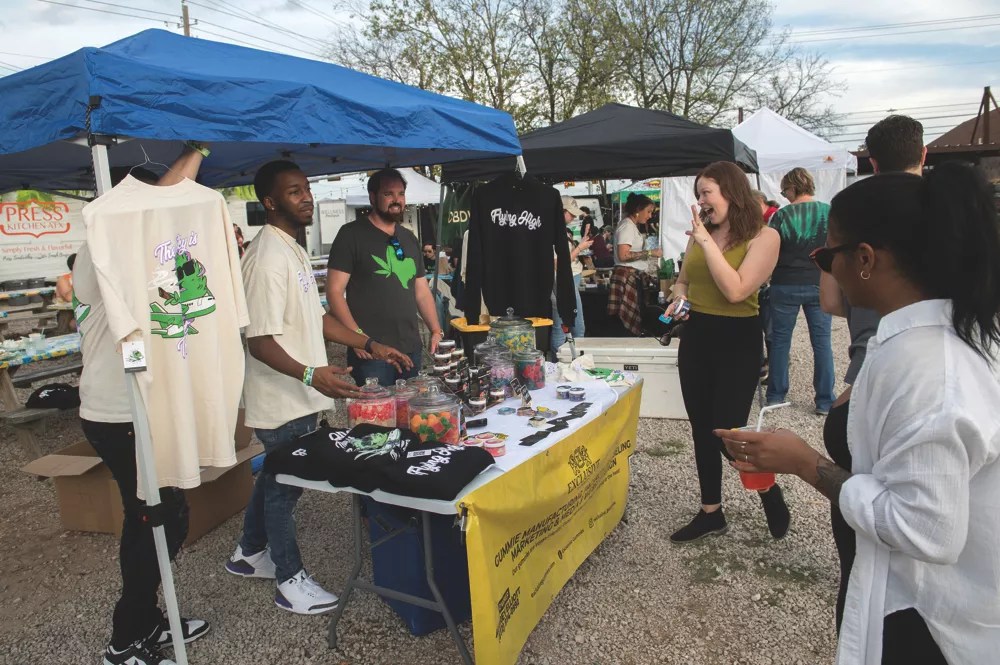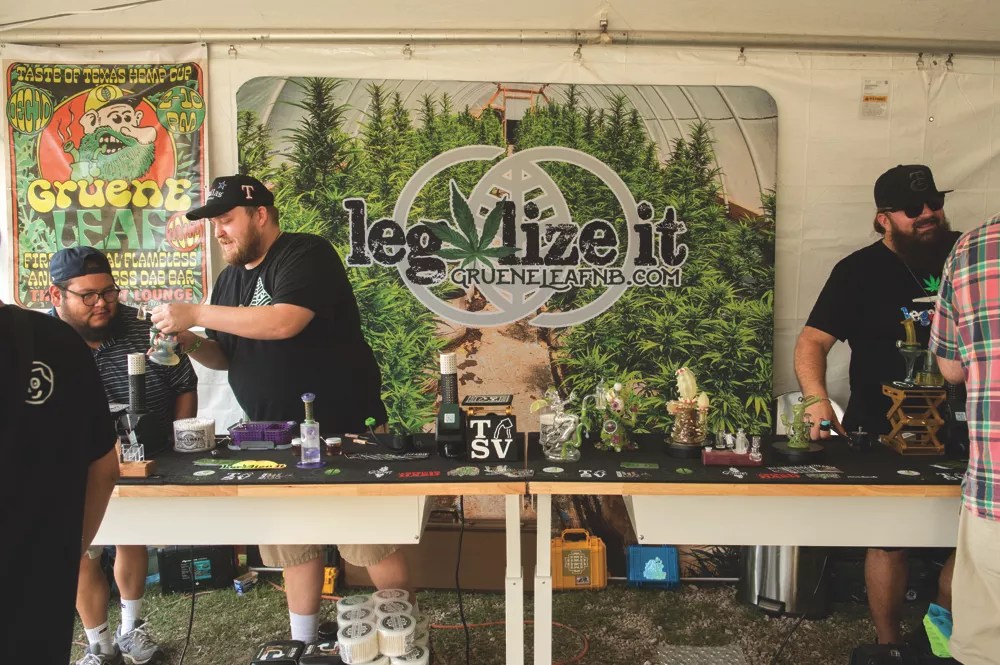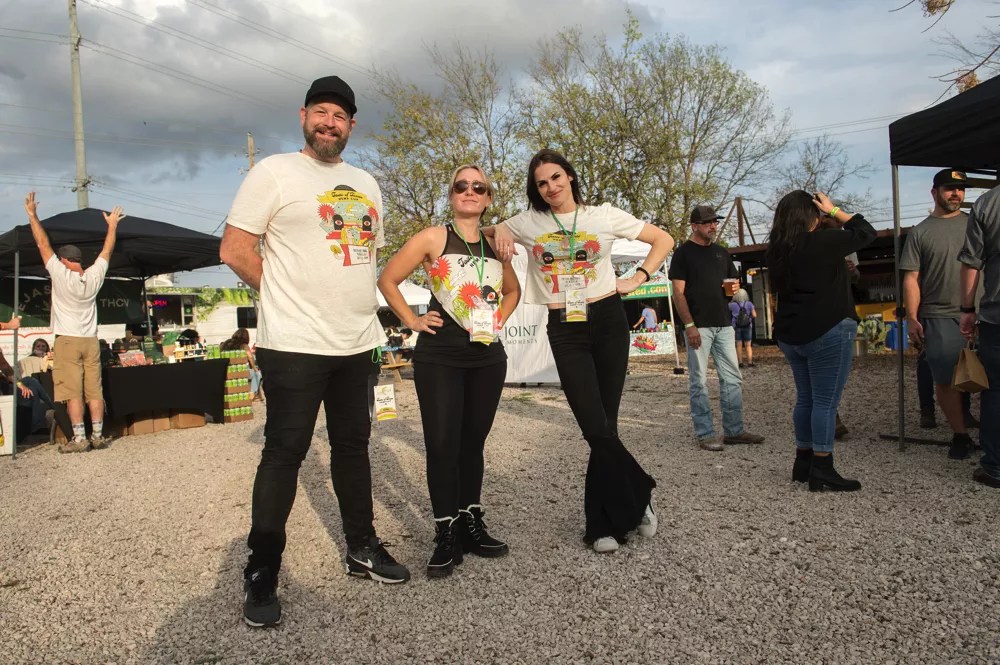
John Anderson

Audio By Carbonatix
Tristan Taylor always thought he’d be a preacher. He liked to talk, so he’d been told growing up that he’d be either behind the pulpit or in front of the camera as a politician spewing promises he wouldn’t keep. Standing 6-foot-1 and weighing 360 pounds, Taylor dreamed of playing in the NFL as an offensive lineman. In 2016, a traumatic injury on a high-school football field near Houston ended that dream. He recalls a neurologist telling him he wasn’t going to the NFL and probably should pick up a golf club.
He overcame the resulting memory issues and a speech impediment with help from cannabis-based products, something Taylor had never messed with when he was on the field. “It helped me cope and sparked a journey to help other people,” he says.
Taylor’s journey led him to co-found TayCo Farms with his family in the small town of Dayton, northeast of Houston. It is, he says, the first company on the cannabis market to offer 100% solvent-free, mass- produced, hemp-based CBD products that contain no more than 0.3% THC, the chemical in marijuana that gets users high. (CBD, short for cannabidiol, is another chemical found in cannabis that doesn’t produce a high but can help alleviate a wide range of ailments including anxiety, epilepsy and pain, users say.) TayCo uses low heat and pressure to extract CBD from hemp plants instead of using solvents like carbon dioxide, nitrogen dioxide, propane, butane or ethanol.
The process led to him becoming one of the youngest Texas hemp farmers to win recognition from High Times Magazine‘s The Hemp Cup: People’s Choice 2022 for the Taylor family’s R.S.O. Capsules.
Support local news on #GivingNewsDay
Today is #GivingTuesday. We in the news business like to think of it as #GivingNewsDay. We’re aiming to raise $30,000 by December 31, so we can continue covering what matters most to this community. If you value our work, we hope you’ll consider making a contribution to our newsroom today.
TayCo Farms developed R.S.O Capsules, also known as “Rick Simpson Oil,” based on the CBD oil created by Rick Simpson, a Canadian cannabis advocate and engineer who sought a way to treat his health issues with marijuana. “There’s very little it can’t do,” Leafly, a cannabis news website, claimed in a June 9, 2022, report, “and a lot it can do for both patients and stoners.”
Taylor and his sister were stoners, he says, and about three years ago they decided to get involved in the cannabis business with their mother. They saw the Texas hemp market as the legal foundation for a larger medical marijuana market should the day ever come when lawmakers listen to the majority of Texans who believe the state should expand its medical marijuana program.

Merchandise on sale at the Taste of Texas Hemp Cup.
John Anderson
When he was 18, Taylor discovered the cannabis business in Colorado, which along with Washington was one of the first two states to decriminalize the use and possession of recreational marijuana in 2012. After his NFL dream ended, Taylor thought of joining the military, but a friend persuaded him to go to Colorado, where Taylor found a job at a hemp company that specializes in CBD oils, CBD tinctures and CBD and delta-8 THC gummies.
The federal government decriminalized hemp containing no more than 0.3% delta-9 THC as part of the 2018 Agriculture Improvement Act, making the CBD extracted from industrial hemp legal in all 50 states. (Hemp is a source of fibers for cloth and other materials, and its seeds produce oil also used in cosmetics and other industries.) The ruling allowed hemp’s transport across state lines for commercial purposes while also acknowledging the right of states to create their own hemp-regulation schemes, something Texas lawmakers have been doing in fits and starts for years.
In 2015, Texas enacted its Compassionate-Use Act, the state’s first legal use of low-THC products for patients with intractable epilepsy, and expanded the state’s cannabis program in 2019 and 2021 to include other medical conditions. Taylor returned to the Houston area and opened a retail store with his family. They now operate a 5,000-square-foot processing facility in Dayton, where they take hemp from other growers and use a proprietary system to manufacture legal products such as CBD tinctures, CBD topicals, CBD smokables and edibles, CBD pre-rolls and CBD-infused coffee and tea. All are made without employing solvents.
In five-star reviews TayCo Farms showcases on its website, customers praise the Taylor family’s CBD products. “By far the best CBD flower I’ve had from Dayton to San Antonio!” writes CBD user Larry Scherer. “Very friendly and knowledgeable staff. The chocolate kicked in faster than any edible I’ve ever had in 20 plus years, a must stop and try place.”
Another reviewer writes she started going to TayCo Farms when her husband was in hospice, seeking an alternative to morphine and methadone. “The gummies are his go-to for liver pain as he waits for a transplant,” the reviewer says. “The tincture oils help tremendously with back pain, sciatica and neuropathy.” As TayCo Farms points out on its website, while CBD does not produce the effects of THC, the World Health Organization reported in 2018 that it can leave users feeling balanced and relaxed.
It can also cause them to fail a drug test if their employer has a no-tolerance drug policy. This is because hemp does contain a small percentage of THC, as Taylor warns on TayCo Farms’ website.
After winning the High Times award, Taylor, who is now 23, sought to snag another honor at the third annual Taste of Texas Hemp Cup awards on Dec. 10 in Austin. He was one of nearly two dozen Texas producers who submitted their CBD-infused smokable and oral hemp products for consideration in nine different categories.
This year, the Taste of Texas Hemp Cup introduced the Texas hemp concentrates and flower competitions for the Best Texas Hemp Concentrate award. Six farmers who turn flowers into concentrates participated, including TayCo Farms.
The Texas hemp farmers who won this year’s awards received a “trayphy,” which is basically an engraved wooden tray that can be hung on the wall or used as a rolling tray.
But the number of such farmers is dwindling, says Liz Grow, a co-founder of Grow House Media and the Taste of Texas Hemp Cup. That’s because “Texas lawmakers can’t get it right, and they’re blocking our farmers at every turn for economic opportunities,” she says. (To be fair, the number of acres being cultivated for hemp has been declining elsewhere since around 2019, Forbes reports. The pandemic is partly to blame, but farmers also were unable to sell some of their crop because of oversupply. Businesses are reluctant to jump into a regulatory environment so disjointed that many banks still won’t do business with hemp-related companies.)
While advocates hope Congress can improve the market with new rules in the upcoming 2023 farm bill, Texas farmers still face unsettled and contradictory regulations coming out of Austin. The latest block came from the Texas Supreme Court in June, when the court upheld a rule from the Texas Department of State Health Services banning the manufacture or processing of hemp products intended to be smoked. While the regulations issued by the Texas Department of State Health Services helpfully defining “smoking” as “burning or igniting a substance and inhaling the smoke or heating a substance and inhaling the resulting vapor or aerosol,” they don’t specifically define which products are forbidden, an agency spokesperson wrote in response to a question from the Observer.
So, let’s play hemp farmer and take a stab at guessing what’s banned: Pre-rolled joints of low-THC hemp would obviously be out. Vape cartridges also appear to be banned. But what about loose buds of low-THC cannabis packaged as tea or a diet supplement? If users have to roll it up or stuff it in a pipe themselves, can it still be made in Texas?
It seems so. Liz Grow says that since the court’s ruling, makers have simply quit encouraging people to smoke their products. Pre-rolled joints have become “CBD sticks,” and the hemp flower “is the hemp flower. Do with it what you will.”
If you were to decide to touch a lighter to a CBD stick or think hemp flowers look lovely set aflame in a bong, no worries. The court’s ruling didn’t apply to possessing smokable products or retailing buds for rolling. Texas companies simply can’t produce smokable hemp products – whatever they are – which explains why two of the four companies that sued the state to challenge the ban have packed up and moved their smokable hemp division from Dallas to Oklahoma.
“Our farmers are able to grow craft hemp, but they can’t sell it in Texas and have to send it out of state,” Grow says. “They got the rug pulled out. This event is significant for that. People want cannabis and craft hemp in Texas.”
***

Hemp is already legal in Texas. Sort of, maybe.
John Anderson
The contradictory nature of the ban on smokable hemp is another step in Texas’ odd one-foot-in and one-foot-out hokey-pokey approach to cannabis reform. As entrepreneurs rush to get their cannabis businesses off the ground, they speed ahead of regulators or look for loopholes in the regulations, only to find themselves either in court or out of business. For example, there’s a continuing battle over the question of whether manufacturers can legally lard their products with delta-8 THC or other variations of the THC molecule that also get users high but are different in chemical structure from the more common – and specifically regulated – delta-9 isomer.
Delta-8, which also produces a high in users, occurs naturally in cannabis plants in tiny amounts but can be chemically derived from CBD found in hemp. Producers argue that the 0.3% limit on delta-9 doesn’t apply to delta-8, and many have rushed to push out products containing delta-8 (to the chagrin of even some marijuana advocates, who fear the downside risk of putting too much faith in the unregulated hands of chemists producing delta-8). State authorities argue that the producers are wrong, and a bill before the Legislature would clear things up by lumping all THC isomers together, limiting all THC content to 0.3% and sinking Texas-based delta-8 makers.
Consider also the state’s “compassionate use” program for medical cannabis, which arguably is neither especially compassionate nor useful. The state has a limited list of ailments OK’d for officially sanctioned CDB treatments, though that list seems to grow a bit with every session of the Legislature. Meanwhile, retailers sell a wide variety of CBD-laden products freely to all comers, including pet owners who think Fido might benefit from a healing dose of hemp.
Even hemp growers who try to follow the rules can find themselves out of business and in trouble if local law enforcement decides to work them over. As the Observer reported in April, Sky & Hobbs Organics in Navarro County had a state license to produce low-THC cannabis, but that didn’t stop authorities there from raiding the business and charging one of the owners with felony possession. Though the charge was later dropped, the business is no more.
Finally, some Texas cities, including Dallas, are adopting policies that call for an end to arrests for minor marijuana possession. This November, Denton voters approved an ordinance intended to curtail arrests by city police for possession of small amounts of marijuana. The votes were barely tallied before the town’s city manager declared that Denton couldn’t fully follow the ordinance its voters approved because it contradicts state law. On Dec. 8, Hays County Criminal District Attorney Wes Mau requested an opinion from Attorney General Ken Paxton on whether a similar ordinance approved by voters in San Marcos is made void by state law.
All of this leaves the Texas cannabis industry struggling in a regulatory scheme that’s less a gray area than one that’s black-and-white plaid, where being on the right side of the law depends on place, the attitudes of local law enforcement and the latest set of regulations handed down by state agencies or OK’d by the courts. Added to this mix are eager entrepreneurs and advocates looking for an edge in business or attempting to push along the state’s slow dance with reform, often, it seems, without regard to the fact that marijuana reform is a political process not amenable to being rushed.
Do Texans really think that local voters should be able to tell state-licensed police officers to not enforce some state laws passed by the Legislature? It’s a safe bet that a sizable number of legislators don’t, and background information included in Mau’s letter to Paxton cited precedents that don’t appear to support San Marcos or Denton voters.
Is it plausible that state regulators intended only to limit naturally occurring delta-9 THC, but were fine and dandy with flooding the state with delta-8, as if what lawmakers objected to was a molecule’s structure, not its effect?
One curious result of all this is that hemp growers and CBD product–makers often say they wish the state would regulate them more: not strictly, necessarily, but clearly, uniformly and fairly.
“It’s heart-breaking,” Grow says. “Texans are suffering, and lawmakers aren’t listening to us.”
In the late 1700s, Founding Father George Washington cultivated large amounts of hemp on his plantation at Mount Vernon, Virginia. Washington was initially interested in developing hemp as a cash crop but, as the website MountVernon.org points out, he changed his mind and focused on the industrial side to use hemp “to meet the needs of his own plantation” for rope, thread for canvas and sacks and for repairing fishing nets.
“The federal government is slow, and Texas hasn’t provided much support. Private industry is trying to get things done.” – Russell Jessup, Texas Hemp Cup judge
Today, Washington might have focused on the cash crop instead. In 2020, the smokable hemp market was worth up to $80 million, and fivefold growth was predicted, according to a Sept. 2, 2020, Hemp Industry Daily report. A year earlier, total sales of all U.S. hemp-derived CBD consumer products had reached approximately $1.2 billion.
As TayCo Farms points out on its website, hemp-derived CBD products from marijuana plants offer consumers a medicinal alternative to pain relief often dominated by highly addictive narcotics.
Taylor says his grandmother was a pot smoker for most of his life. She has scoliosis, and at 81 she deals with aches and pains and arthritis by using cannabis. That led Taylor to start researching resin, the thick sticky oil marijuana produces. He began learning how to extract resin to create CBD products. He calls himself a health-conscious person who seeks to build a brand that allows people with health issues to use his product without it interfering with their daily activities.
Taylor claims that what makes his company different is that he and his sister are in their early 20s and part of a younger group of cannabis entrepreneurs who are pressing the natural resin from hemp flowers. He uses heat and pressure to formulate the resin into products. He calls it a more organic process with no chemical solvents.
But he acknowledges that 45% of his business is on the smokable hemp side. Taylor argues the Supreme Court ruling won’t end its use. It will simply force Texas farmers to sell their products in other states while out-of-state businesses are allowed to flood the Texas market with their smokable hemp products, causing money that should remain in Texas to flow out of state.
“It’s not right,” Taylor says, using a quote that he heard from another hemp farmer to explain it in a way that even conservatives like Lt. Gov. Dan Patrick will understand: “‘How are you going to tell a Texas beef farmer you can’t sell steaks in Texas?’ Texas will hopefully get its head on straight.”
***
In 2020, Sarah Kerver was at home, thinking about the upcoming first-ever hemp harvest season. A year had passed since the state began allowing Texas farmers to grow hemp, and then COVID-19 hit. She knew how much money and time producers had spent to grow the first hemp crop in more than 70 years. She’d been involved in the Austin cannabis community for a while and was one of the first small-business owners to launch a hemp brand, 1937 Apothecary, in the capital. She says she hated to see Texas farmers’ efforts go unrecognized.
“I was like, ‘Man, it’s almost harvest season, and this sucks. I know how much they put in to make history with the first grow ever and be able to harvest, and it is COVID year, and this sucks. What a disservice,'” recalls Kerver, a president of the Texas Cannabis Council, an advocacy group that focuses on development of the Texas industry. She is also a co-founder and co-producer of the Taste of the Texas Hemp Cup.
Kerver knew her limitations, though, and that she couldn’t take on this endeavor alone. She wanted to partner with someone who could get the word out and talk with the community and realized that Liz Grow and Patrick Pope with Grow House Media were the perfect partners to create the Taste of Texas Hemp Cup, the first industry-wide event honoring Texas farmers.
“It just became a whole ‘it takes a village’ thing, and it really took all of the community to come together to make it happen,” Kerver says.
Organizers held the first Taste of Texas Hemp Cup in December 2020 on some private land and implemented COVID safety protocols to keep everyone safe. About 300 people attended, and 15 farmers submitted CBD-infused flowers for judging, followed by 30 farmers for the 2021 Taste of Texas Hemp Cup. Though only 26 submitted for this year’s cup, Kerver says they were expecting 1,500 people to attend the Dec. 10 event at The Far Out Lounge & Stage in Austin.
TayCo farms didn’t come away with a win at this year’s Taste of Texas Hemp Cup. The 2022 winners were Geremy Greens’ “Lifter” for Best Hemp Flower in Texas; Errganiz’s “Pink Panther” for People’s Choice; and EndoZondo’s “Bubba Kush 59” for Best Final Presentation.
Most Ripe went to Fresh Grown TX’s “Space Invader,” and Most Pungent went to Clutch City Farms’ “Apple Smacks,” which also nabbed the Highest CBD award. Oak Cliff Cultivators won the Highest CBG for “Hawaiian Haze,” while Tejas Hemp won Best Outdoor Grow for “Garlic Jam” and Yanasi Farms snagged the Best Indoor Grow for “Half-Baked.”
The Best Texas Hemp Concentrate went to Snickelfritz of Gruene Leaf, a family-owned Texas cannabis boutique in New Braunfels.
A checklist of qualities to consider for the Taste of Texas Hemp Cup accompanied the judges’ samples and recommends rating the farmers’ product based on presentation, taste, trichomes, aroma, pungency and consumption.
Judge Russell Jessup, a professor from the Perennial Grass & Industrial Hemp Breeder program at Texas A&M University, has been placing his samples under the microscope to judge quality. He’s a plant breeder who’s seeking to improve hemp’s genetics to make it more uniform by improving tools to breed crops. The program is sponsored by Dallas’ Rare Earth Microeconomics, a partnership formed to accelerate hemp research and a sponsor of the Taste of Texas Hemp Cup.
“We look at it for the color trichomes, If they’re clear, opaque or brown, and try to relate to ripeness and whether it is mature or over mature,” Jessup says, referring to the tiny resin-filled glands on the surface of marijuana flowers that can make some strains appear to be coated with frost. He says hemp’s uses in industry can grow once research catches up.

Taste of Texas Hemp Cup organizers Patrick Pope, Sarah Kerver and Liz Grow.
John Anderson
“Hemp and cannabis haven’t been researched in 70 years,” he says. “The federal government is slow, and Texas hasn’t provided much support. Private industry is trying to get things done.”
But Taylor and other Texas farmers in the industry took a hit in June when the Texas Supreme Court approved the ban on smokable products.
Kerver, who also owns Custom Botanical Dispensary, was one of those involved in the 2019 lawsuit against the Texas Department of State Health Services. She told the Austin Chronicle in August 2020 that smoking and vaping CBD-based hemp products offers faster relief to users than oral applications, and that it was a huge driver of business for hemp-based companies, consisting of 50% of their revenue.
The court’s ruling, Kerver says, doesn’t keep people from accessing smokable hemp, especially when Texas is surrounded by states where cannabis has been decriminalized at some level.
“It’s they’re not as supportive, and I just think that they’re not educated enough to understand the harm caused by not regulating things and not having things done right,” Kerver says. “Just saying no is like telling your teenagers not to do stupid things. You can’t just throw ‘no’ out there, especially when it’s all around us.”
Hemp offers far too many benefits to list, she says, yet Texas lawmakers have been “demonizing” it.
It’s another reason why she says the Taste of Texas Hemp Cup is needed. It both honors the farmers and educates the public about the benefits of smokable hemp.
“It’s not going to go away,” Kerver says. “It continues to grow, and the illicit market is going to continue to grow. It surrounds our borders, and cannabis is coming from every direction. Texas has a huge black market. Everybody around us is feeding that black market. It’s hard for people like myself who are trying to do things legally and follow the guidelines. The state isn’t helping us do everything right and that is hard.”